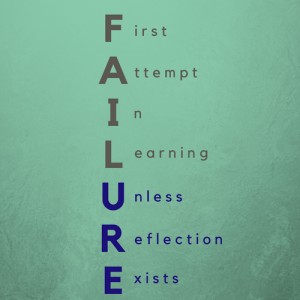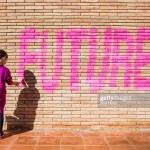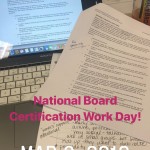Their motions are similar: Wide-eyed, pupils darting from side to side, hands fidgeting, an upturn of a smile only to be replaced by a quick, nervous bite of the lips. They scan the room, looking for both a seat and a familiar face.
My internal actions are also similar: a heartbeat that my Fitbit registers as cardio, butterflies in my stomach, a million thoughts racing through my head: I forgot to turn the music on. Is the AC even working? Why are my palms sweating? Don’t forget to smile as you greet them at the door, Jen. Stop overthinking. Be in the moment. There. That’s better.
But the situation is different.
They are not the seventh-grade students I am used to; they are first-year high school and middle school teachers, adults of varying ages and professional backgrounds. They are anxious to get in their classrooms and meet their students. They are used to being in control; they are suddenly not.
I am no longer an English Language Arts teacher in my classroom, but rather a beginning teacher mentor, facilitating these teachers’ first professional development at our district’s office. I am anxious to meet my teachers. I am used to not being nervous, but suddenly, I am.
Through our conversations that day in July, one comment from one of the teachers truly stuck out: “I just don’t want to fail. This job is too important for failure to be an option.” What developed from the group was a discussion about the different hats teachers wear that make our jobs meaningful. Looking back and reflecting upon the session, what I wish would have developed was a discussion about the idea of ‘failure’ and the pressure it puts on educators. Both my first-year teachers and I were feeling anxiety partially because of our desperate desire to not to fail.
The words ‘fail’ and ‘failure’ have such a negative connotation, especially in education. As a society, we label our schools with letter grades that supposedly denote varying levels of ‘success.’ Educators are evaluated on rubrics with point values allowing them to work towards becoming ‘accomplished.’ We hold our breaths when school letter grades come out and make sure our evaluator sees us earning our points. We don’t want to ‘fail.’
We’ve all seen the FAIL acronym; many of us have had posters of First Attempt In Learning in our classrooms to motivate our students, but oftentimes teachers are paralyzed by the idea of failing ourselves. We work our hardest to make sure our lessons are successful, that our assessments accurately measure student learning, that our classroom environments are ones where all students feel valued and loved. A bad lesson can change our mood. An assessment where students don’t perform as expected can lead to anger. An unkind word or action can lead us down the path to guilt. We identify that we ‘failed’ but don’t know our next steps.
Recently, I came across the design-thinking guru, the Tech Rabbi, Rabbi Michael Cohen. He added to the traditional FAIL acronym, by making it FAILURE:
If we ‘fail’ and do nothing with it, all we do is learn that what we did didn’t work. But reflection allows teachers and students alike to modify, to recreate, think through, problem-solve, and grow. This growth is what makes us better teachers, learners, and people. The 3Ps in a Pod podcast from Season 4, Episode 1 even brought up the fact that “reflection turns into action.” How do we actively reflect when our days are already so full?
For my beginning teachers, my observations and our conversations focus on four main questions: What’s working? What are the current challenges, concerns, or needs? What is the teacher’s next steps? What is the mentor’s next steps? These observations and discussions are thus framed in a way that both of us can be reflective and no one gets stuck, even when some challenges, concerns, and needs may seem overwhelming.
For me, some days, I write in a simple notebook. Often it is chicken scratch shorthand, and that’s OK. Some days, I talk myself through my day’s successes and failures as I drive between schools, or to the daycare provider’s to pick up my son. I find talking aloud allows me to be more focused than an interior dialogue, which tends to take unproductive tangents. I look like a crazy person as I’m driving, but that’s OK too.
I’ve found that my first attempts in learning during in this new position must be met with the action of reflection so I can, as NBPTS Core Proposition 4 states, “think systematically about [my] practice and learn from experience.” Without identifying how I move on from those first attempts in learning, I simply can’t move on and can’t learn from experience; I stay stuck, and no one wants to be stuck. To slightly alter the words of my beginning teacher in that July meeting, “This job is too important to be stuck.”











Comments 4
I love the addition of reflection in the ‘Failure’ acronym. You make such a good point about reflection being what ensures that we truly learn and grow from the situation. I feel like this important for myself as a teacher, but also for me to teach my students about this too.
Since I am like across the street at PHS can I walk down and steal your FAIL poster.. Absolutely LOVE it !!!
I also like the quote that “failure is an event, not a person.” I have learned more from failing, reflecting, and retrying than I have from getting something right the first time. I love the idea that “this job is too important to be stuck”!
This is such an excellent blog. I love how it paints a picture of the desperate need to succeed–and the importance of teaching how reflection can turn our F-A-I-L-U-R-E into learning. Great new acronym. I think that everyone does their absolute best, given the training and knowledge they have. It’s so important that we provide training as well as talking/reflection time for ALL teachers, not just the new ones. Thanks for this post.